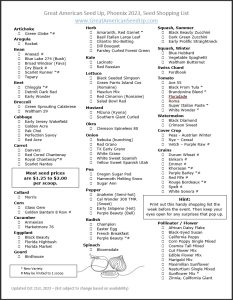 In today’s world, accessing information has become incredibly easy thanks to technology. But with the vast amount of knowledge at our fingertips, it’s easy to become overwhelmed, especially when searching for specific resources like seed saving techniques. In a recent Seed Chat (Urban Farm’s monthly online zoom class) held on July 18th, Greg Peterson and Bill McDorman shared invaluable insights into uncovering relevant information for all things related to seed resources. From local gardening expertise to the nuances of seed varieties, this discussion sheds light on the importance of finding the right sources and simplifying your approach.
In today’s world, accessing information has become incredibly easy thanks to technology. But with the vast amount of knowledge at our fingertips, it’s easy to become overwhelmed, especially when searching for specific resources like seed saving techniques. In a recent Seed Chat (Urban Farm’s monthly online zoom class) held on July 18th, Greg Peterson and Bill McDorman shared invaluable insights into uncovering relevant information for all things related to seed resources. From local gardening expertise to the nuances of seed varieties, this discussion sheds light on the importance of finding the right sources and simplifying your approach.
Starting Locally: The conversation emphasized the value of tapping into your local community for information. Veteran gardeners who have weathered years of seasonal cycles and trials can offer valuable advice and solutions. Landscapers with decades of experience on the ground can share practical insights that transcend theoretical knowledge. Often, local sources are overlooked in favor of national conferences or online resources. However, the wisdom from those who understand the local conditions can be the most important research you conduct in your journey of gardening and seed saving.
Beware of the Cult of Expertise: Bill McDorman cautioned against the pursuit of expert-level knowledge. While modern society promotes specialized expertise, delving into various subjects related to seed saving and gardening can be overwhelming. Instead of getting lost in a sea of information, Bill suggests a more focused approach. He advocates for simplicity and emphasizes the importance of finding the information that directly aligns with your needs and goals.
Taking a Step Back: Bill and Greg shared insights on modern tendencies to drown in vast amounts of data. While technology grants us access to a wealth of information, it’s not always leading to meaningful solutions for real-world problems. Bill suggests stepping back from the data overload and focusing on what truly matters – personalized solutions that can be implemented at the community level. By grounding your search for resources in practical applicability, you can make meaningful changes that resonate with your needs.
Getting Nichey and Focused: Greg Peterson likened the advice to the concept of “getting nichey” in business. The idea is to focus deeply on a specific area and excel in it. Bill McDorman shared his experience with his high-altitude seed company, which focused on a particular niche, contradicting the conventional wisdom of expanding for wider reach. The principle is applicable to seed resources as well – identifying a specific need and focusing on acquiring knowledge in that area can lead to greater mastery and impact.
Exploring Seed Resources: The discussion turned towards a collection of seed resources that can aid those seeking to expand their seed-saving knowledge. These resources cover a range of topics, from seed classes and online education to books that provide comprehensive insights into gardening, seed saving, and more. Among the standouts mentioned were “The Resilient Gardener” by Carol Deppe, “Seed Time” by Scott Chasky, and “The Dao of Vegetable Gardening” by Carol Deppe. These resources offer readers a chance to dive deep into the art and science of growing and saving seeds.
Ancient and Heritage Grains: Bill McDorman emphasized the importance of grains in the quest for self-reliance in food production. With challenges such as climate change and global dynamics affecting grain supply chains, it’s essential to relearn the craft of growing and saving grains. Resources like Amy Haller’s “The New Breadbasket” offer insights into the movement towards more diverse and regional grain systems, highlighting the significance of growing grains that are adapted to specific local conditions.
Seed Libraries and Exchanges: The conversation concluded with a discussion about seed libraries and exchanges. These community-driven initiatives provide platforms for sharing and acquiring seeds, fostering a culture of abundance and sustainability. Bill emphasized the importance of community involvement and encouraged the sharing of seeds grown organically. While not all seeds available in these libraries might be organic, the focus on diversity and adaptation remains paramount.
Navigating the sea of available information on seed saving and gardening can be overwhelming, but by focusing on local knowledge, simplifying your approach, and seeking out experts, you can enhance your skills and make a meaningful impact in your community. Engaging with resources such as books, seed libraries, and online courses can provide a well-rounded education, further enriching your journey towards self-reliance and sustainability. Remember, the beauty of seed resources lies in their ability to connect us to the Earth and each other, reminding us of the power of shared knowledge and community engagement.


